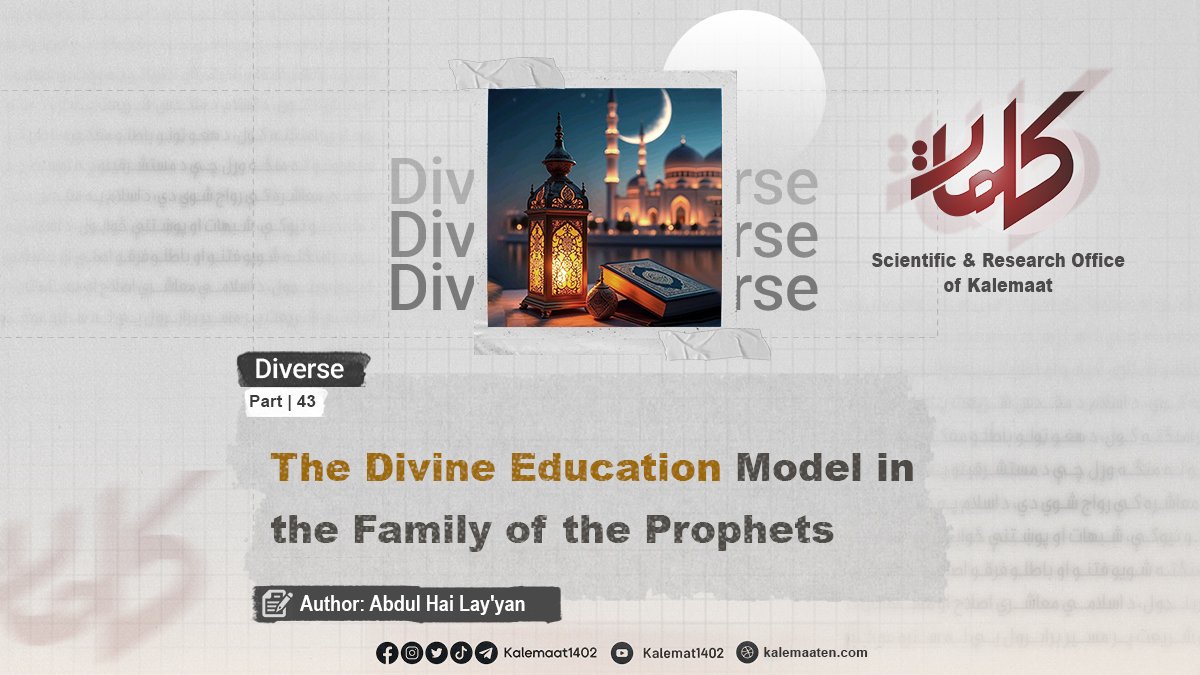Author: Abdul Hai Lay'yan
The Divine Education Model in the Family of the Prophets (Part 43)
Lesson Six: The Gradual Method in Education, Invitation, and Advice
Prophet Ibrahim (peace be upon him), in the path of guiding and inviting his father, adopted a very gentle and wise method. With kindness and patience, he tried to separate his father from the idols he worshipped. Ibrahim (peace be upon him), in this path, attributed idol worship to Satan, since such worship is nothing but Satanic whispers and delusions. He repeatedly mentioned the name of Satan to emphasize more clearly the evil and reprehensible nature of this act. The Holy Qur’an states: “یا أَبَتِ لَا تَعْبُدِ الشَّیطَانَ إِنَّ الشَّیطَانَ كَانَ لِلرَّحْمَنِ عَصِیاً.” [1]” This method gradually rendered the misleading reality of polytheism worthless. [2]
A Question to Create Awareness and Doubt
In the gradual process of Prophet Ibrahim’s (peace be upon him) words to his father, a clear progression can be observed. At first, with gentle and awakening questions, he urged his father to think. In the previously mentioned verse, he asked him: “إِذْ قَالَ لِأَبِیهِ یا أَبَتِ لِمَ تَعْبُدُ مَا لَا یسْمَعُ وَلَا یبْصِرُ وَلَا یغْنِی عَنكَ شَیئا.” [3] “
This question was not an insult or a direct accusation, but rather a subtle way of completing the argument. Instead of directly calling his father misguided, Ibrahim (peace be upon him) asked him why he worshipped something that no sound mind would approve of. The essence of worship is that a person sees himself humble before a being greater, more knowledgeable, and more powerful than himself. So how could one worship something that is even lower than animals—something that neither hears, nor sees, nor is capable of doing any good or harm?[4]
Rational Logic, the First Step in Invitation
In fact, even if that object of worship were a living, hearing, and knowledgeable being such as angels or prophets, sound intellect would still refrain from worshipping it. For reason sees these beings as needy and submissive to the power of the One God. The question of Ibrahim (peace be upon him) to his father was a deep and motivating reminder to create doubt. This method is an effective way of dismantling false beliefs, since placing doubt in the heart of a misguided person urges him to seek the truth and find a worthy alternative for worship.
This Abrahamic method is a great lesson for those who invite others to Islam: the first step in inviting non-Muslims is rational reasoning. Such individuals do not believe in Qur’anic verses or Hadiths; therefore, confronting them with religious texts will have no effect. First, the truth of Islam must be proven through rational evidence, and later, appropriate verses and Hadiths may be used as a supplement.
This method is important for the following reasons:
– A Common Language: Logic and reason are universal languages free from religious and cultural bias. By using this tool, one can speak with any individual, from any religion or background, and encourage them to reflect.
– Creating Doubt: Just as Ibrahim (peace be upon him) instilled doubt in his father by asking questions, rational reasoning helps the audience question their previous beliefs and search for a logical and correct alternative. This doubt is the key to the gate of truth-seeking.
– Proving the Truth: Rational arguments can help prove the existence of the One God and His perfect attributes, the prophethood of Muhammad (peace and blessings be upon him), and the comprehensiveness of Islam. For example, one may refer to the argument of order in the universe, the argument of contingency and necessity, or the argument of innate disposition to point to the existence of a wise and powerful Creator.
– A Prelude to Faith: Once the audience, through logic and reason, accepts the truth of Islam’s fundamental principles, they become more prepared to embrace faith and religious texts. At this stage, Qur’anic verses and Hadiths play a complementary role, deepening belief and introducing the details of religious teachings.
Gradualism and Progression in Invitation
This method also teaches educators and preachers how to be effective with gradual steps and progression in invitation and advice. Prophet Ibrahim (peace be upon him), in inviting his father, moved from a gentle and awakening question (“Why do you worship…”) to a direct prohibition (“Do not worship Satan…”). This method was fully in harmony with his well-known patience and forbearance.
Gradualism in education and invitation is a necessity and a desirable approach, because changing deeply rooted beliefs or habits requires time and inner readiness. Beginning with gentle and thought-provoking questions, like the method of Ibrahim (peace be upon him), allows the audience to approach the truth step by step, without facing strong resistance or defensive reactions. Moreover, presenting all religious teachings and laws at once may confuse or even repel the audience. Therefore, gradualism in invitation creates a logical and continuous bridge between different stages of education, preventing sudden gaps. Each stage becomes a prelude for the next.
Thus, educators must design a step-by-step program in which every stage prepares the ground for the next, without sudden breaks. They should also use tools and methods appropriate to each stage of education so that the audience receives and accepts their message in the best possible way.
Continues…
Previous Part / Next Part
References:
[1]. Maryam: 44.
[2]. Naseruddin Abdullah, Beyzawi, Anwar al-Tanzil and Asrar al-Tawil, vol. 4, p. 8; Mohammad Seyyed Qutb, in the shadows of the Qur’an, vol. 4, p. 2311; Hassan Mohammad Bajouda, Reflections on Surah Maryam, Cairo: Dar al-Nasr, 1978, pp. 88-87.
[3]. Maryam: 42.
[4]. Muhammad Mahmoud, Hijazi, al-Tafsir al-Shazrah, Beirut: Dar al-Kitab al-Arabi, 1402 AH, vol.2, p.10; Imad Zuhair, Hafez, Qur’anic stories between fathers and sons, pp. 78-77.



